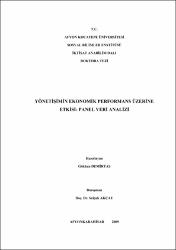| dc.contributor.advisor | Akçay, Selçuk | |
| dc.contributor.author | Demirtaş, Gökhan | |
| dc.date.accessioned | 2015-03-20T09:11:48Z | |
| dc.date.available | 2015-03-20T09:11:48Z | |
| dc.date.issued | 2009 | |
| dc.date.submitted | 2009 | |
| dc.identifier.uri | http://hdl.handle.net/11630/3105 | |
| dc.description.abstract | 1980’li yılların sonunda, piyasa merkezli düzenlemelerin, gelişmekte olan ülkelerde sürdürülebilir bir ekonomik büyümeyi sağlamada tek başına yeterli olmadığı görülmüştür. Bu bağlamda yönetişim kavramı, devletin ekonomideki düzenleyici rolünü destekler nitelikteki politik yükümlülüklerini belirlemektedir. Uluslararası finansal kuruluşlara göre, iyi yönetişim yerleşmiş bir demokrasi, hukukun üstünlüğü prensibinin sürdürülmesi ve bürokrasi kalitesinin artırılması gibi üç temel bileşene sahiptir. Sürdürülebilir bir ekonomik büyüme oranı birçok makroekonomik sorunun çözümüne yardımcı olmaktadır. Bu nedenle çalışmada ekonomik performans göstergesi olarak ekonomik büyüme oranı alınmıştır.
Bu tezin amacı, 108 ülkede yönetişimin ekonomik performans üzerine etkisini 1988-2004 yılları arasında, panel veri yöntemi kullanarak incelemektir. Analizde, ülkeler önce gelişmiş ve gelişmekte olan ülkeler olarak kategorize edilmiştir. Daha sonra, gelişmekte olan ülkeler coğrafi bölgelere ve gelir düzeylerine göre ayrılmıştır. Çalışmanın sonuçları, sınırlı sayıda bulgu göz ardı edildiğinde, yönetişimin ekonomik performans üzerine etkisinin olmadığını göstermektedir. Bu durum, neo-liberal iktisadi düşünceyi benimseyen finansal kuruluşların politika önerilerinin beklenen sonuçları vermediği anlamına gelmektedir. Ayrıca ampirik bulgular, yönetişim bileşenlerindeki gelişmelerin, ekonomik büyümeyi engellemediği sonucunu da ortaya koymaktadır. | en_US |
| dc.description.abstract | In the late 1980s, it has been seen that market-oriented regulations was not solely sufficient to provide a sustainable economic growth in developing countries. In this context, the concept of governance determines political obligations of the state those are supporting state’s regulatory role in the economy. To the international financial institutions, good governance has three fundamental components namely, established democracy, maintenance of rule of law, well-qualified bureaucracy. The sustainable economic growth contributes to solve many macroeconomic problems. Therefore, in the study, economic growth rate is taken as an economic performance indicator.
The aim of this dissertation is to examine impact of governance on economic performance in 108 developed and developing countries for the period of 1988-2004 by using panel data analysis. In the analysis, countries are categorized as developed and developing ones, and then developing countries are assorted into geographic regions and income levels. Overall test results show that, in the case of disregarding only a limited number of models, governance components have no effect on economic growth. This means that suggestions of international institutions, adopting principles of neo-liberal economic thoughts regarding the governance, have not provided the desired impacts on economic growth. Empirical findings, also, reveal that the improvements in governance components do not hinder economic growth. | en_US |
| dc.language.iso | tur | en_US |
| dc.publisher | Afyon Kocatepe Üniversitesi, Sosyal Bilimler Enstitüsü | en_US |
| dc.rights | info:eu-repo/semantics/openAccess | en_US |
| dc.subject | Ekonomik Büyüme | en_US |
| dc.subject | Panel Veri | en_US |
| dc.subject | Yönetişim | en_US |
| dc.title | Yönetişimin ekonomik performans üzerine etkisi: Panel veri analizi | en_US |
| dc.title.alternative | The effect of governance on economic performance: Panel data analysis | en_US |
| dc.type | doctoralThesis | en_US |
| dc.relation.journal | Afyon Kocatepe Üniversitesi, Sosyal Bilimler Enstitüsü | |
| dc.department | Afyon Kocatepe Üniversitesi, Sosyal Bilimler Enstitüsü, İktisat Anabilim Dalı | en_US |
| dc.relation.publicationcategory | Tez | en_US |



















